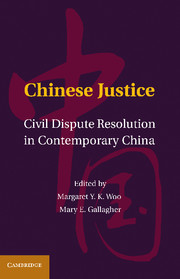Book contents
- Frontmatter
- Contents
- Tables and Figures
- Contributors
- Acknowledgments
- Abbreviations
- Glossary
- Introduction
- PART I LEGAL DEVELOPMENT AND INSTITUTIONAL TENSIONS
- 1 From Mediatory to Adjudicatory Justice: The Limits of Civil Justice Reform in China
- 2 Judicial Disciplinary Systems for Incorrectly Decided Cases: The Imperial Chinese Heritage Lives On
- 3 Legalizing the Local State: Administrative “Legality” at China's Grassroots
- 4 Economic Development and the Development of the Legal Profession in China
- PART II PU FA AND THE DISSEMINATION OF LAW IN THE CHINESE CONTEXT
- PART III LAW FROM THE BOTTOM UP
- Conclusion: Chinese Justice from the Bottom Up
- Index
- References
1 - From Mediatory to Adjudicatory Justice: The Limits of Civil Justice Reform in China
Published online by Cambridge University Press: 05 July 2011
- Frontmatter
- Contents
- Tables and Figures
- Contributors
- Acknowledgments
- Abbreviations
- Glossary
- Introduction
- PART I LEGAL DEVELOPMENT AND INSTITUTIONAL TENSIONS
- 1 From Mediatory to Adjudicatory Justice: The Limits of Civil Justice Reform in China
- 2 Judicial Disciplinary Systems for Incorrectly Decided Cases: The Imperial Chinese Heritage Lives On
- 3 Legalizing the Local State: Administrative “Legality” at China's Grassroots
- 4 Economic Development and the Development of the Legal Profession in China
- PART II PU FA AND THE DISSEMINATION OF LAW IN THE CHINESE CONTEXT
- PART III LAW FROM THE BOTTOM UP
- Conclusion: Chinese Justice from the Bottom Up
- Index
- References
Summary
INTRODUCTION
One of the most conspicuous changes in judicial policy toward the end of Xiao Yang's two terms (1999–2008) as president of the Supreme People's Court (SPC) was the retreat from a concerted period of civil justice reform, the origins of which can be traced back to 1979 and which was at its most intense during the decade prior to 2006. The hallmark of this recent change in approach has been a shift of priority from adjudicatory to mediatory justice.
By 2006, the SPC had openly conceded the failure of judicial reform programs aimed at enhancing judicial professionalism. The SPC had also issued a series of judicial interpretations to steer the judiciary toward settlement of disputes through court-based mediation. Because of this policy change, local courts are revising their incentive mechanisms to encourage judges to privilege mediation in resolving disputes and to reward them for doing so. Judges and legal scholars are rediscovering the virtues of court-based mediation, including its efficiency, cost-effectiveness, and humanity.
This chapter, in seven parts, studies this transition by examining the rise, demise, and partial resurgence of court mediation in Chinese justice. Section I details the development of the civil justice system of the People's Republic of China (PRC) and explains how its political marginalization helped create the space for its subsequent reform. Section II analyzes what might be termed phase one of the reform process, including the factors driving the striking shift from mediatory toward adjudicatory justice.
- Type
- Chapter
- Information
- Chinese JusticeCivil Dispute Resolution in Contemporary China, pp. 25 - 57Publisher: Cambridge University PressPrint publication year: 2011
References
- 14
- Cited by



